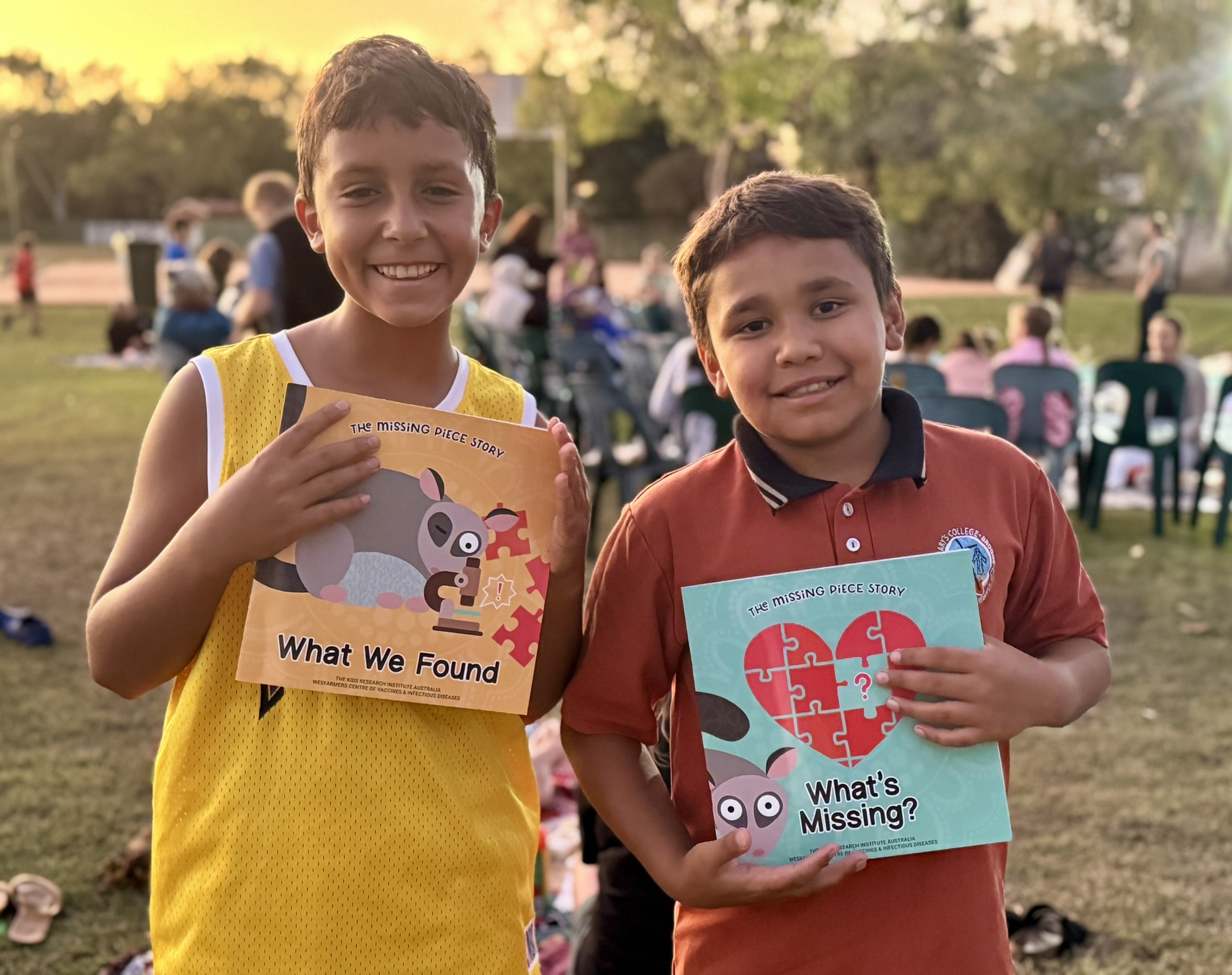Search

News & Events
WA Government launches ‘game-changing’ nasal influenza vaccine program for kidsWestern Australian kids will have access to a needle-free nasal flu vaccine for the first time in 2026 as part of a new initiative to boost vaccination rates against the life-threatening virus.

News & Events
Spectacular sunset launch for the Missing Piece Story BooksWesfarmers Centre of Vaccines and Infectious Diseases researchers Dr Janessa Pickering and Dr August Mikucki travelled to Broome last week for the official launch of the long-awaited Missing Piece story books.

News & Events
$3.4 million funding boost supercharges fight against RSVNational research led by the Wesfarmers Centre of Vaccines and Infectious Diseases, based at The Kids Research Institute Australia, has secured more than $3.4 million to assess the epidemiology of respiratory syncytial virus (RSV) throughout the country and optimise Australia’s immunisation strategy.
Research
Early Oral Antibiotic Switch in Staphylococcus aureus Bacteraemia: The Staphylococcus aureus Network Adaptive Platform (SNAP) Trial Early Oral Switch ProtocolStaphylococcus aureus bloodstream infection is traditionally treated with at least 2 weeks of intravenous antibiotics in adults, 3-7 days in children, and often longer for those with complicated disease. The current practice of treating S. aureus bacteremia with prolonged IV antibiotics (rather than oral antibiotics) is based on historical observational research and expert opinion. Prolonged IV antibiotic therapy has significant disadvantages for patients and healthcare systems, and there is growing interest in whether a switch to oral antibiotics following an initial period of IV therapy is a safe alternative for clinically stable patients.
Research
Immunogenicity, reactogenicity, and IgE-mediated immune responses of a mixed whole-cell and acellular pertussis vaccine schedule in Australian infants: A randomised, double-blind, noninferiority trialIn many countries, infant vaccination with acellular pertussis (aP) vaccines has replaced use of more reactogenic whole-cell pertussis (wP) vaccines. Based on immunological and epidemiological evidence, we hypothesised that substituting the first aP dose in the routine vaccination schedule with wP vaccine might protect against IgE-mediated food allergy. We aimed to compare reactogenicity, immunogenicity, and IgE-mediated responses of a mixed wP/aP primary schedule versus the standard aP-only schedule.
Research
Population pharmacokinetics of penicillin G: insights into increased clearance at low concentrations to guide development of improved long-acting formulations for syphilisAlthough benzylpenicillin (penicillin G) is listed by the World Health Organization as an Essential Medicine, dose optimization is a persistent challenge, especially for long-acting intramuscular formulations. Maintaining sustained antibiotic exposure at target concentrations is crucial for secondary chemoprophylaxis of rheumatic heart disease and treatment of syphilis.
Research
Hospitalizations Following Complex Hip Surgery in Children with Intellectual Disability: A Self-Controlled Case Series AnalysisTo evaluate the associations between complex hip surgery and subsequent hospitalizations in children with intellectual disability, including a subset of children with cerebral palsy.
Research
An Overview of the Skin Microbiome, the Potential for Pathogen Shift, and Dysbiosis in Common Skin PathologiesRecent interest in the diverse ecosystem of bacteria, fungi, parasites, and viruses that make up the skin microbiome has led to several studies investigating the microbiome in healthy skin and in a variety of dermatological conditions.
Research
Genetic Correlates of Biological Aging and the Influence on Prediction of MortalityLongevity and disease-free survival are influenced by a combination of genetics and lifestyle. Biological age (BioAge), a measure of aging based on composite biomarkers, may outperform chronological age in predicting health and longevity. This study investigated the relationship between genetic risks, lifestyle factors, and delta age (Δage), estimated as the difference between biological and chronological age.
Research
Same-visit hepatitis C testing and treatment to accelerate cure among people who inject drugs (the QuickStart Study): A cluster randomised cross-over trial protocolDespite universal access to government-funded direct-acting antivirals in 2016, the rate of hepatitis C treatment uptake in Australia has declined substantially. Most hepatitis C is related to injecting drug use; reducing the hepatitis C burden among people who inject drugs is, therefore, paramount to reach hepatitis C elimination targets.
